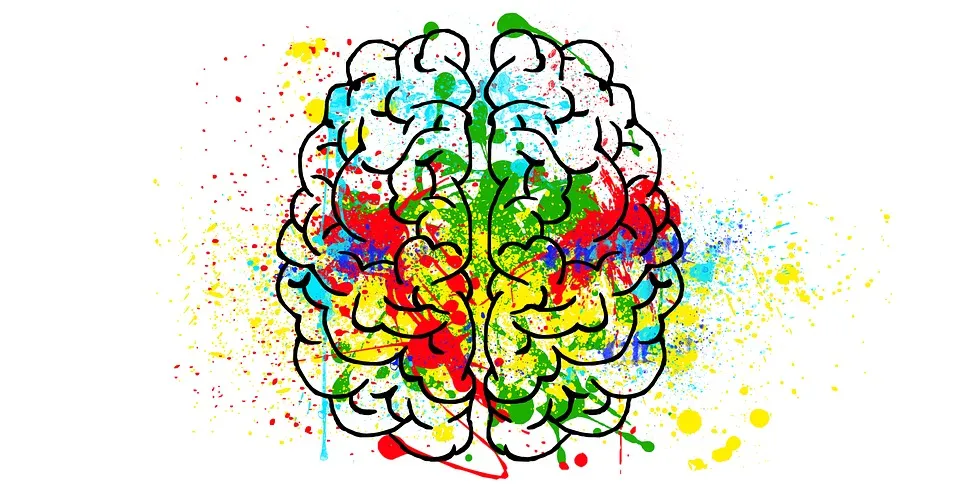Today´s post was inspired by a comment made to "Is Alzheimer’s Disease Caused By Viruses?". This comment stated various things I do not agree with like AD and cancer were merely emotional diseases. You can decide for yourself if you agree with this statement or not, I do not. However, there is some truth to this comment. There are diseases that can be triggered by emotional state, and our feelings and thoughts can make us sick.
I was one of those kids that HATED school. Everything was always so slow, such a waste of time. Needless to say, I wanted out. What better excuse than feeling sick?
This day will always be in my memories. I decided that I had enough schooling for one day and started pretending to feel sick. Already being a master at this game, my family was informed and somebody came to pick me up. I had to continue the show so nobody would become suspicious. Anyways, when I arrived home, I got out of the car and threw up, even though I was feeling fine. The power of the mind. How could an elementary schoolboy make himself throw up even though he was absolutely fine?

Our mind is a powerful tool. It enabled us to overcome complex problems by finding innovative ideas that we draw from sometimes mundane observations. Things that happen in our heads are beautiful, scary, colorful, dark. It is a fascinating and yet not well world inside our heads, one that attracts huge research efforts. Yet people say we know more about the surface of the moon than about our brains. This lack of knowledge may be one of the major causes of disease. Because the power of the mind goes well beyond creativity and feelings. Our mind does influence the state of our body more than we thought for a long time. Many diseases are now, at least in part, attributed to an unhealthy emotional state.
I remember a scene from the formerly popular TV show "Scrubbs". A lady was suffering from heart disease, but medicine was unable to determine why. Turns out a loved one had died and she was suffering from "broken heart syndrome". I picked this particular example because the relation between unhealthy emotional state and heart disease has been investigated for a while, and I think the connection may be a little bit more obvious. Here is why I think that.

We all know of the fight or flight response. A stress stimulus causes our peripheral nervous system to slow our digestive system down and to focus our blood and energy supply to the major muscle groups (a shift from non-conscious to the conscious system if you will). This response is natural, and in most cases not harmful. In fact, if controlled to be triggered 2-3 times a week for roughly 30 minutes this system seems to be very healthy (a good workout routine). Our heartrate (HR) and blood pressure (BP) go up, we start sweating and feel energized. This is all natural and there is no reason to avoid sports (unless your heart is not healthy enough, check with your doctor). The problem is that in our modern world there are more stressors than ever, some of which do not seem so obviously stressful. Various stressors affect us in our everyday life. In a medicine book I found calculating in your head to be a stressor. There are several studies that show a correlation between noise exposure and incidence of CD. These studies were often linked to air traffic and car traffic as noise sources. A study suggested that this is not proof of a cause-effect relationship. Car noise comes from cars, which also produce fine particles, which are themselves a possible CD causing agent. The data for a possible correlation between noise and CD is not yet conclusive enough to determine it as an independent factor. This examplifies a general problem in the stress/disease theory. What is stress?
Friedrich Schiller, a very famous German poet, is rumored to have loved the smell of rotting apples. My whole family likes mushrooms while I hate them. Some people like to talk about every little detail of their day while others prefer to be quiet. These examples are more relevant than you may think. While Schiller was pleased by rotten apples, others may be very stressed out by the sight. While my brother may feel good eating mushrooms, I dread them. While others feel relieved sharing their thoughts with everybody they see, others may feel annoyed. It is very difficult to pin down exactly what a stressor is.
Additionally, the type of stress we experience is different. As I said, the fight flight response is natural and used to occur relatively frequently. These days, it is much more seldom (usually only if we go to the gym). A theory I encountered in "Lehrbuch der inneren Medizin" introduced an interesting idea. Our lives become faster, not physically, but emotionally. We can get around faster and talk to more people faster. This causes the number of inputs (stimulants) to raise. In the book they stated that the number of inputs we receive daily increased 1000x compared to our grandparents (this book is from 1992 btw). While each input itself may only pose a small stress level, the sum may be overwhelming. Additionally, each input may only cause a small physical reaction (like slightly increased BP and HR). However, since we receive so many inputs, the response is prolonged over very long periods of the day. While this can be tolerated for a while, this prolonged stress response can become chronic (and possibly irreversible). This is a possible direct link between stress and disease. However, how is this related to our mind-disease idea?
In addition to "living faster", our lifestyle provides us with many opprtunities to compare us to others. We are pressured by a perceived requirement to be succesful financially, to be individual, to have many friends and even to be happy. Never before were we subjected to such a vast amount of suggestions as to how we should live our lives.

Here an illustration. Mr. Richards works in an office. By accident, he stumbles upon a video on Youtube, which has been posted by an Australian guy. Mr. Richards sees images of people working by the beach, drinking ice-cold beer while hammering code into their laptops. "They are doing what I am doing, but seem to be much better of and happier than I am", Mr. Richards thinks. He is jealous, he wants that lifestyle for himself. But he is scared of the risks. He tries to think through how he could achieve such a lifestyle. Does he really want to quit his job and live in a foreign country? Will he make enough money? He sees more videos. People say that they should just go for it. What can happen? What could be worse than the situation they are already in? People are too scared to pick up their dreams. Mr. Richards starts feeling bad, his self-esteem drops because he feels like a failure for being to scared to live out of a backpack.
This constant comparison of what we have to what others have can cause us to lose focus of who we are and what is best for us. It also subjects us to immense pressure. Anxieties arise, and the risk of becoming depressed increases. And this is a very dangerous condition, not just for our minds, but also our bodies.
Depression is a very complex disease and I have heard various explanations for it ranging from infections of the cortex to "willingness" to be depressed. Some of the more accepted causes are social isolation, constant pressure, genetic predisposition and conditioning when we were kids. Depression has been found to be a possible independent risk factor for cardiovascular disease (CD). Especially the onset of myocardial infarctions seems to be influenced by a depressed mood. Even the aforementioned Broken Heart Syndrome could be seen as a possible link between depression and heart disease. Intense emotional stress can trigger heart insufficencies.
But even pre-depressive emotional distress can be unhealthy. Almost everything I have talked about above can be classified as stress (stressors, comparison, social isolation, etc.). Acute stress influences the immune system. It can activate the immune system and surpress the immune response, thus potentially affect the occurance of cancer and CD. Generally, it appears that both cancer and CD are more frequent in highly stressed people.
The key in this model are so called cytokines. Pro-inflammatory cytokines are there to invoke inflammatory responsed and are part of our immune system. However, they interact with many different systems in our body. Some of these systems are linked to the pathological (bad) changes that are associated with depression. This includes neurotransmitter metabolism and even behavior.
Let´s take a step back and take a look at the big picture. Bad thoughts can induce emotional stress, which can trigger immune responses that influence our health and mood, in the worst case leading to more bad thoughts that can enhance the effect, ultimately putting us at risk of falling into a depression. While stress itself can increase the risk of CD, general illnesses and even cancer, depression causes another independent risk factor. As you can see, a sad mind could be at greater risk of falling ill. But what can we do?
Well, that is a tough question. Looking at my argument here the solution at hand would be to adopt a positive mindset. To some this is very easy, for others almost impossible. One study even suggested that there is no "universal" prevention and that the most succesful preventive actions were more "treatment" than actual prevention. This shows that prevention of despression and stress are for each individual to figure out. However, there are things that may help. Excercise could help in the prevention of anxiety and depression, eventhough I found at least one study that stated the available data was inconclusive.
I will share personal experiences. We all have depressive tendencies, at least once or twice in our life. As I stated, there is no universal preventative method. This is solely my own observation, I do not claim scientific accuracy or general applicability.

With these words I will end today´s post. There is much more I could talk about, more detail as well as application of the mind-disease theory (for example in healing). I will leave this to somebody else. This is a very complex topic, interesting nontheless, and I would recommend everybody to read about it. Body and mind are closely connected. A broken body can corrupt the mind, and vice versa. Stick with what makes you happy. Be mindful of your friends and do not force yourself to be social if you are not.
General Sources
- Oldest study indicating link between personality and ability to deal with stress Link
- Articles showing link between disease and psyche suspected for long time Link
- Calculating in your head can raise HR and BP and be a stressor - Table 1.50, Chapter 1 from "Lehrbuch der inneren Medizin" 1992 (Siegenthaler, Kaufmann, Hornborstel, Waller)
- General Physiology enquiries "Human Physiology: From Cells to Systems" 2016 (Sherwood)
- Broken Heart Syndrome - Link
- Attachment and Psychosomatic Medicine: Developmental Contributions to Stress and Disease - Link
- How does stress affect you? An overview of stress, immunity, depression and disease - Link
- Depression and the risk for cardiovascular diseases: systematic review and meta analysis - Link
- Cytokines sing the blues: inflammation and the pathogenesis of depression - Link
- Exercise in prevention and treatment of anxiety and depression among children and young people - Link
- The prevention of depressive symptoms in children and adolescents: A meta-analytic review - Link
- A meta-analytic review of depression prevention programs for children and adolescents: Factors that predict magnitude of intervention effects - Link
- Psychosomatic medicine on ScienceDirect - Link
- Article in The Telegraph by Neurologist Suzanne O´Sullivan - Link
Studies Suggesting Link Between Noise And CD
- Traffic Noise and Risk of Myocardial Infarction - Link
- Traffic noise and cardiovascular disease : Epidemiological review and synthesis - Link
- The association between noise exposure and blood pressure and ischemic heart disease: a meta-analysis - Link

Thank you for reading today´s post. If you have any opinions I would be happy if you want to share them in the comments. If you are interested in this topic and want to write about it I could give you some pointers about possible topics. If you spotted mistakes please let me know (be nice or I will just ignore you).
As always,
Cheers @lesshorrible!